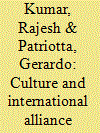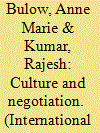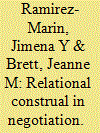|
|
|
Sort Order |
|
|
|
Items / Page
|
|
|
|
|
|
|
| Srl | Item |
| 1 |
ID:
111476


|
|
|
|
|
| Publication |
2011.
|
| Summary/Abstract |
One of the most effective means for re-establishing trust in negotiations and disputes is by making an apology. However, the function and meaning of an apology (and thus its effectiveness for negotiators) may differ across cultures. We hypothesized that people from an individual-agency culture (such as the United States) understand apologies as analytic mechanisms for assigning blame and re-establishing personal credibility. In contrast, apologies in collective-agency cultures (such as Japan) are understood to be general expressions of remorse rather than a means to assign culpability. A survey of Japanese and Americans found that, compared to Americans, Japanese apologized more often and were more likely to apologize for actions in which they were not involved; on the other hand, Americans were more likely than Japanese to equate apologizing with personal blame. A subsequent experimental study showed that these cultural differences in the function and meaning of apologies have implications for trust repair in disputes: apologies for integrity violations led to greater trust repair for Japanese than for Americans, but apologies for competence violations were somewhat more effective for Americans than Japanese. Implications for theory and practice are discussed.
|
|
|
|
|
|
|
|
|
|
|
|
|
|
|
|
| 2 |
ID:
111480


|
|
|
|
|
| Publication |
2011.
|
| Summary/Abstract |
International alliance negotiations are now a pervasive feature of the contemporary global economy. As the alliancing firms cross national boundaries to forge cooperative partnerships they face the inevitable necessity of bridging the cultural divide to ensure successful negotiation. Existing research has focused primarily on the impact of national cultural differences in shaping negotiating strategies and ensuing outcomes. Less attention has been paid to how negotiators from different cultures understand and manage the ambiguity of international alliance negotiations. We employ the theoretical lens of sensemaking to understand how negotiators embedded in different cultures manage simultaneously the task and cultural related ambiguity that they are confronted with. This perspective suggests the critical role that `tertius iungens' (the `third who joins') plays in facilitating the negotiation process. The `tertius iungens' represents a form of intermediation that acts as a catalyst in the negotiation process. We propose three alternative types of intermediation, namely, cognitive, affective, and holistic and provide illustrative examples of these types of intermediation. We conclude by highlighting the theoretical and managerial significance of our framework and by suggesting future directions for research.
|
|
|
|
|
|
|
|
|
|
|
|
|
|
|
|
| 3 |
ID:
111473


|
|
|
|
|
| Publication |
2011.
|
| Summary/Abstract |
The literature on cross-cultural negotiation has expanded considerably over the past few decades, but the findings are often ambiguous and sometimes even contradictory. This introduction highlights the critical areas where objections are commonly raised about the relevance of national culture, the applicability of typologies that treat cultures as static, and the problem of ambiguous terminology. It may not be surprising that studies contradict each other given the ambiguity of the national cultural construct and variations in the context of the negotiating situations that are studied. The articles in this issue contribute to deepening our understanding about cross-cultural negotiation processes.
|
|
|
|
|
|
|
|
|
|
|
|
|
|
|
|
| 4 |
ID:
111474


|
|
|
|
|
| Publication |
2011.
|
| Summary/Abstract |
Research on culture and negotiation is critical for expanding theories of negotiation beyond Western cultures and for helping people to manage their interdependence in a world of increasing global threats and opportunities. Despite progress of understanding cultural influences on negotiation, research is limited in that it portrays a static and decontextualized view of culture and ignores cultural dynamics. The almost exclusive focus on main effects of culture in negotiation has its roots in a subjectivist approach to culture which has prioritized the study of values, or trans-situational goals. In this article, we discuss the descriptive norms approach to culture and its promise for the study of culture and negotiation. A descriptive norms approach highlights the dynamics of culture in negotiation (i.e., the conditions under which culture effects become amplified, reduced, or even reversed), it identifies new empirical mediating mechanisms for cultural effects, and it sheds new light into understanding cultural competence in intercultural negotiations.
|
|
|
|
|
|
|
|
|
|
|
|
|
|
|
|
| 5 |
ID:
111478


|
|
|
|
|
| Publication |
2011.
|
| Summary/Abstract |
The current study extends prior negotiation research on culture and verbal behavior by investigating the display of nonverbal behaviors associated with dominance by male and female Canadian and Chinese negotiators. We draw from existing literature on culture, gender, communication, and display rules to predict both culture and gender variation in negotiators' display of three nonverbal behaviors typically associated with dominance: relaxed posture, use of space, and facial display of negative emotion. Participants engaged in a dyadic transactional negotiation simulation which we videotaped and coded for nonverbal expression. Our findings indicated that male Canadian negotiators engaged in more relaxed postures and displayed more negative emotion, while male Chinese negotiators occupied more space at the negotiation table. In addition, use of space and negative emotion partially mediated the relationship between culture and joint gains, as well as satisfaction with negotiation process. We discuss contributions to cross-cultural negotiation literature, implications for cross-cultural negotiation challenges, as well as future studies to address cultural variation in the interpretation of nonverbal cues.
|
|
|
|
|
|
|
|
|
|
|
|
|
|
|
|
| 6 |
ID:
111477


|
|
|
|
|
| Publication |
2011.
|
| Summary/Abstract |
This article uses an intercultural bargaining framework to analyze cooperation and conflict between buyers and sellers in intercultural negotiations. On the basis of game theoretical reasoning, culturally embedded bargaining patterns are transformed into culturally determined strategies in intercultural negotiations. The cultural differences of the players can be seen in the initial offer, the strategic approach, the valuation of time, the frequency of rejection and the objectives of the negotiation. In order to provide prescriptions for cross-cultural bargaining, the clash of cultures is dealt with in nine scenarios to show potential conflicts and cooperation between the players.
|
|
|
|
|
|
|
|
|
|
|
|
|
|
|
|
| 7 |
ID:
111479


|
|
|
|
|
| Publication |
2011.
|
| Summary/Abstract |
When involved in disputes, people's stereotypes about one another and the situation can influence their attributions of motives and effectiveness at resolving the dispute. Stereotypes may be of particular concern when disputing parties have little knowledge about the individual across the table. In this study, we examined how respondents from different cultures evaluated the economic and relational goals of two disputing merchants - one from the West and the other from the Middle East. We tested the extent to which respondents' expectations of the targets' goals were driven by: 1) cultural information about each disputant (whether the merchant-disputant comes from the West or from the Middle East) and 2) the respondent's own culturally-based mental model for approaches to resolving work-related disputes. We found very little evidence of cultural stereotyping in that respondents views of the Target Merchants' goals were largely independent of the said culture of the Target Merchant. We did however find strong evidence that respondents from the United States, Turkey and Qatar hold different mental models about the goals a party has when resolving a work-related dispute. In particular, US respondents had a more variable-sum orientation than the other cultural groups, especially Qataris, whose mental model evidenced a fixed pie assumption regarding economic and relational goals. For example, Qataris and Turks viewed a goal of Maximizing one's Own Gain as impeding a goal of Maximizing the Other Party's Gain. Similarly, Qataris viewed Defending Honor as incompatible to the goals of Relationship Building and Giving Face, whereas Americans and Turks did not hold such a view. These differences, based on the country of the respondent, are discussed in detail.
|
|
|
|
|
|
|
|
|
|
|
|
|
|
|
|
| 8 |
ID:
111475


|
|
|
|
|
| Publication |
2011.
|
| Summary/Abstract |
In certain cultures, relationships are the reason for negotiation. In this article, we offer a rationale regarding why relationships have more or less salience across cultures. We present psychological, economic and sociological factors that explain the reasons for negotiating relationally. Propositions are made as to how cultural construal about relationships influences offers, targets and limits, negotiation strategy and, ultimately, economic and relational outcomes. Our major explanatory construct is new: cultural consensus about relationships. This construct is grounded in well developed theory of self construal and new empirical research showing the utility of measures of consensus in explaining cultural differences in behavior. With this theoretical contribution, we join the group of scholars who are advocating that more attention should be paid to negotiators' subjective evaluations of the social and emotional consequences of negotiation.
|
|
|
|
|
|
|
|
|
|
|
|
|
|
|
|
|
|
|
|
|